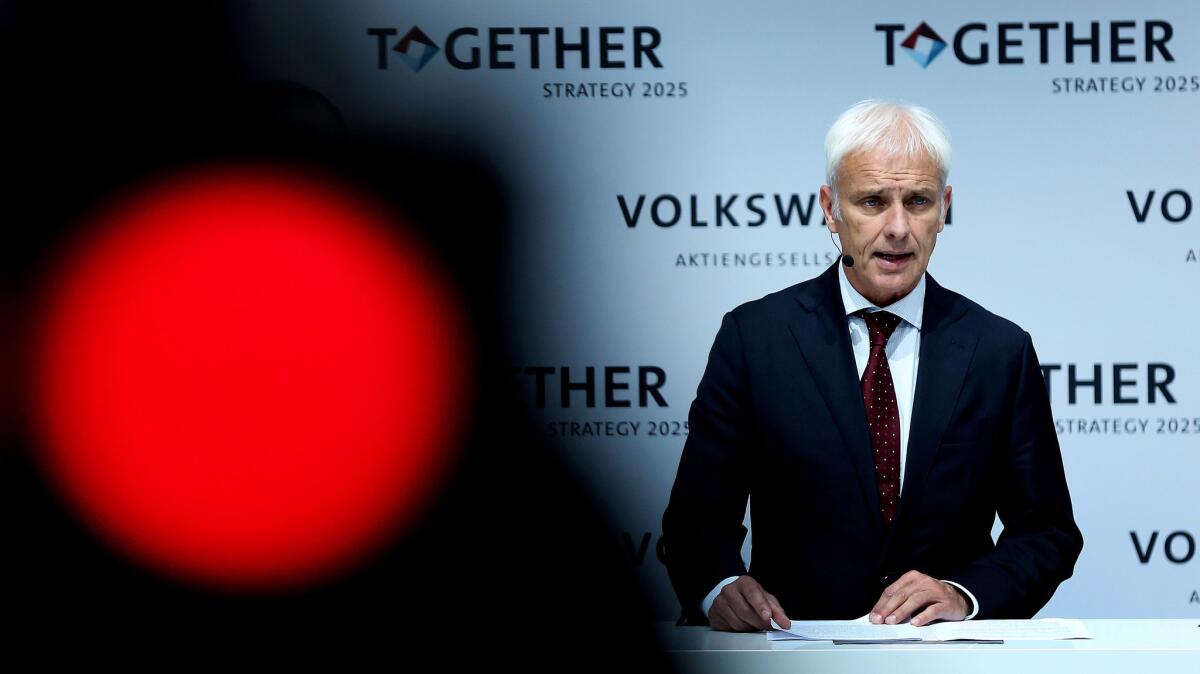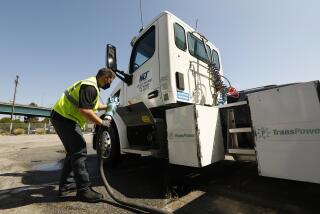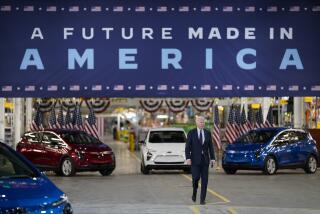After emissions cheating scandal, Volkswagen steers toward electric vehicles

Here’s one way to atone for the biggest emissions cheating scandal in automobile history: Go all out on zero-emission vehicles.
Volkswagen announced Thursday that it would spend $11.2 billion to create more than 30 electric car models by 2025, develop autonomous vehicles and move into the ride-hailing business.
“This is a big shift,” said Michelle Krebs, a market analyst for Auto Trader.
And high risk. VW is “slicing pieces off a very small pie,” said Jessica Caldwell, director of industry analysis at Edmunds.com.
But Volkswagen is in a pinch. Caught systematically cheating on emissions tests on its diesel engines, VW repelled potential customers, infuriated regulators and took an $18.3-billion earnings hit last year to deal with the fallout. Vehicle sales are down 13% in the first five months of 2016.
See the most-read stories in Business this hour »
Now, the company is aggressively trying to recover its reputation.
“The future program we’re unveiling today ushers in the biggest change process in the history of Volkswagen,” Chief Executive Matthias Mueller said at a news conference in Germany. “We are building a new, a better and an even stronger Volkswagen.”
Mueller’s plan was accompanied by some corporate self-reflection.
“This will require us — following the serious setbacks as a result of the diesel issue -- to learn from mistakes made, rectify shortcomings and establish a corporate culture that is open, value-driven and rooted in integrity,” he said.
Despite the emergence of electric cars over the last few years -- with Tesla, BMW, Chevy and Nissan releasing their own models -- electric cars, plug-ins and hybrids account for only 2.45% of the market, according to Edmunds.com.
The market has been declining since it peaked at 3.7% in 2013, according to the same site, in part because of falling gasoline prices.
Analysts recently projected that number to increase to 8% by 2022. Volkswagen, which also owns Audi and Porsche, hopes electric vehicles will account for as much as 25% of its total sales by 2025.
That figure might be optimistic, auto industry experts said.
“It’s a risky statement because unless there’s policy changes in the U.S or gas prices spike, it’s not going to change,” Caldwell said.
But Mueller seems to be banking on a shift in customer attitude, influenced by government policy.
Rainer Baake, state secretary of Germany’s Ministry of Economy and Energy, said recently all new cars sold in Germany would need to be emissions-free by 2030 to meet the nation’s pollution-reduction goals.
India’s minister of Power, Coal, New and Renewable Energy, Piyush Goyal, said government incentives aim to make India a 100% electric car country by 2030.
China’s government aims to make the nation the world’s leading market for electric cars.
And in California, automakers that sell vehicles in the state are required to make 15.4% of them zero-emission vehicles by the 2025 model year.
FULL COVERAGE: Volkswagen’s emissions scandal »
But governments have not banned internal combustion engines. If buyers don’t flock to zero-emission vehicles according to government timelines, the goals could easily change.
Electric car advocates take heart in the 400,000 customers who’ve put deposits down on the $35,000 Tesla Model 3, expected to be delivered starting in late 2017, as an indication of growing interest in electric cars.
Yet, while 17.5 million cars and light trucks were sold in the U.S in 2015 -- a record high -- only 115,000 of them were plug-in electric vehicles. And that figure was 5,000 lower than in 2014.
alexander.schiffer@latimes.com
ALSO
Volkswagen announces an $11.3-million investment in California
California lawmakers unplug the state’s electric car program
Volkswagen to take $18.2-billion hit on emissions scandal







